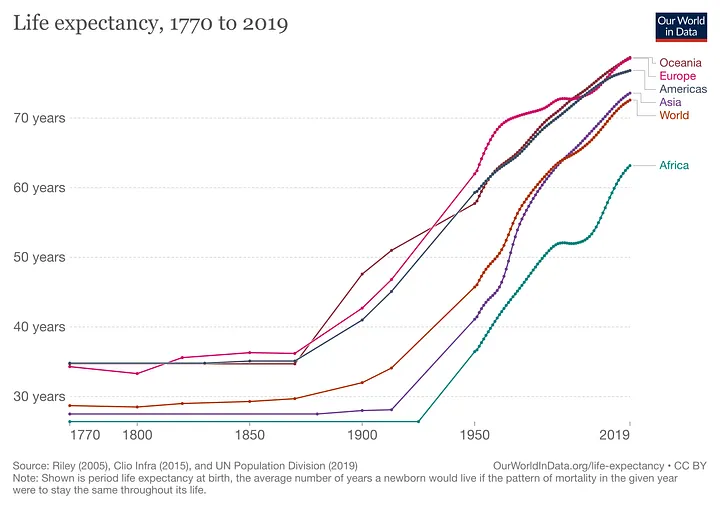The quest for immortality is going on forever by philosophers, scientists, artists, and researchers who have long obsessed over the key to everlasting human life.
Death is inevitable.
We will die regardless of income, religion, and cultural ties. Even if we escape fatal diseases or accidents, we are all at risk of biological degradation.
Please look at the following graph; in the past several hundred years, our life expectancy is increasing, but we still need a lot of work to stay healthier. In this article, I will try to share how we can extend our life expectancy while living a healthier life.

Significant attempts have been embarked on in the last century to increase human lifespan. In achieving this goal, the essential areas of attention have been public health policy and robust healthcare systems.
Indeed, these innovative initiatives increased average life expectancy as we can see in the graph, first in wealthy nations and subsequently in emerging economies.
With the rate of technology development, almost all of the world’s countries will have a super-aged or ultra-super-aged population, which is a tremendous accomplishment.
However, as we reached a higher average age, we discovered another reason for longevity: a healthy life expectancy. Scientists say that there is still a 10-year disparity between long-life and healthy-life expectancy.
Healthy refers to both physical and mental states of mind. It’s worth mentioning that a 10-year disparity in healthy life expectancy exists in both wealthy and developing nations. For details, please see image-A.
To develop healthy and productive habits in search of living a long life, I am experimenting with 30-day challenges.
Here are 15+ 30-day challenges I completed to build sustainable tiny habits to boost productivity and health. Please have a look.
List of 30+ days of challenges I have completed this year.
I Drank 3.78 Liters of Water Daily for 30 days
I read at least 20 pages daily for 30 days
I did not Consumer Coffee for More Than 30 Days
I miserable Failed to Complete my 30 Days Sugar Challenge
I Drank 3–4 liters of Water Daily for the 60-day
I did a 2-minute plank exercise daily for 4+ weeks
I did 20 Push-ups daily for 30+ days
I walked at least 20 minutes daily for 30 days
I Took a 15–20 Minutes Power Nap Every Day for 33 Days
I Did 20 Squats and Push-Ups Daily for 42 Days
I Drank a Tablespoon of Extra Virgin Olive Oil Daily for 32 Days
I Did Not Shampoo My Hair for 35 Days
I Took a Cold Shower Every Morning for 33 Days
I Walked 10,000 Steps Each Day for 42 days
The objective of this article is a long and healthy lifespan. No one organization can develop a viable answer independently. Instead, a highly interactive collaboration is necessary to embark on this research.
Smarter healthcare systems
Longevity is seen positively by healthcare specialists and the public. On the other side, economists and business leaders may be frustrated about the same issue, and fearful of decreased economic power.
Today’s technology allows us to maximize our health individually and lead us to live healthy lives. We employ diagnostic tools to inform decision-making methods on an individual healthcare basis.
Diagnostic techniques such as gene sequencing and wearable health-tracking gadgets are increasingly inexpensive.
Stay mentally occupied to live a longer life
People that live a long and healthy life do not believe in retiring or sitting inactive. You can do anything for the rest of your life as long as you’re having fun. It is up to the person to determine what they are interested in doing.
P4 medicine
The term P4 medicine (predictive, preventative, personalized, participatory) was coined by Dr. Leroy Hood of the Institute for Systems Biology to demonstrate his framework to detect and prevent disease through extensive biomarker testing, close monitoring, deep statistical analysis, and patient health coaching.
In an aging society, P4 medicine becomes more significant. Continuous monitoring, intervention, and data analysis are required in communities, schools, hospitals, and organizations throughout people’s lives.
Resilient healthcare supply chains, especially post-pandemic
To prepare for a healthy lifespan, we need strong supply chains. COVID-19, on the other hand, has demonstrated that our systems are susceptible.
Pharmaceutical and medical equipment firms cannot meet the massive demand for medical items in an emergency.
Many non-medical enterprises, such as those in the automotive and electronics sectors, have aided emerging supply increases by offering to build products on demand.
However, more collaboration between medical and non-medical businesses is needed to help construct more robust supply chains.
A multi-stakeholder partnership
Traditional commercial and medical networks in every nation across the globe have varied norms, motivations, and chances for collaboration, which might hinder collaboration.
In general, pharmaceutical restrictions do not allow for rapid development. In short, medical practitioners trust medical representatives from established corporations but are skeptical of fledgling digital start-ups.
Elderly carers trust local volunteers but have fewer possibilities to discuss difficulties with international businesses. A multi-stakeholder strategy is recommended in which specialists from many backgrounds cooperate to achieve common objectives that may offer tangible ideas.
I recently wrote an article on the blue world zone, an area where people live the most extended and healthy life. In this article, scientists are saying that soon people will be able to extend their life expectancy beyond 120 years.
According to my research, there is a particular lifestyle that can help us to live longer. Let me recall the main point, and for details, you can read this article.
Find a passion and purpose in your life
Stay mentally occupied to live a long life
Always stay close to your friends and family
Getting rid of the hurry sickness always means being in a hurry to meet short or long-term goals.
I highly recommend walking at least 150 minutes per week.
Book recommendation: The Longevity Paradox: How to Die Young at a Ripe Old Age (amazon affiliate link)
Thank you for reading; follow me, and clap a couple of times. Thanks

